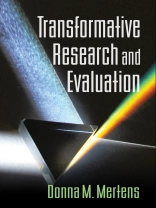From distinguished scholar Donna M. Mertens, this book provides a framework for making methodological decisions and conducting research and evaluations that promote social justice. The transformative paradigm has emerged from—and guides—a broad range of social and behavioral science research projects with communities that have been pushed to the margins, such as ethnic, racial, and sexual minority group members and children and adults with disabilities. Mertens shows how to formulate research questions based on community needs, develop researcher–community partnerships grounded in trust and respect, and skillfully apply quantitative, qualitative, and mixed-methods data collection strategies. Practical aspects of analyzing and reporting results are addressed, and numerous sample studies are presented. Student- and Instructors-Friendly Features Include:*Commentary on the sample studies that explains what makes them transformative.*Explanations of key concepts related to oppression, social justice, and the role of research and evaluation.*Questions for Thought to stimulate critical self-reflection and discussion.*Advance chapter organizers and chapter summaries.
表中的内容
Introduction The Intersection of Applied Social Research and Program Evaluation Paradigms Rationale for the Transformative Paradigm Breadth of Transformative Paradigm Applicability1. Resilience, Resistance, and Complexities That Challenge In This Chapter Human Rights Agenda The Transformative Paradigm as a Metaphysical Umbrella Need for Transformative Research and Evaluation Examples of Transformative Research and Evaluation Examples of Shifting Paradigms Need for the Transformative Paradigm and Scholarly Literature Need for the Transformative Paradigm and Public Policy Complexities That Challenge Ethical Impetus Striving for Improved Validity Summary2. The Transformative Paradigm: Basic Beliefs and Commensurate Theories In This Chapter Paradigms and Basic Belief Systems The Transformative Paradigm and Its Basic Belief Systems Theories Commensurate with the Transformative Paradigm Politics and Power Summary3. Self, Partnerships, and Relationships In This Chapter Human Relations as Factors Contributing to Research Validity and Rigor Knowing Yourself Knowing Yourself in Relation to the Community Cultural Competence Strategies for Developing Relationships/Partnerships Types of Partnerships/Relationships Challenges in Relationships/Partnerships Recognizing the Complexity of Culturally Competent Work Purposes of Partnerships Examples of Points of Interaction in the Research Process Building Capacity Summary4. Developing the Focus of Research/Evaluation Studies In This Chapter Purposes for the Gathering of Information at This Stage of the Inquiry Sources That Support the Need for Research and Evaluation Theoretical Frameworks Making Use of Sources Summary5. A Transformative Research and Evaluation Model In This Chapter Cyclical Models: Indigenous Peoples Cyclical Model: PARCyclical Models: Immigrant Communities Short-Term Research and Evaluation Types of Transformative Research and Evaluation Transformative Intervention Approaches Summary6. Quantitative, Qualitative, and Mixed Methods In This Chapter Mixed- and Multiple-Methods Approaches Case Studies Ethnography Phenomenology Participatory Action Research Appreciative Inquiry Experimental and Quasi-Experimental Designs Survey Design and Correlational and Causal-Comparative Studies Gender Analysis: A Mixed-Methods Approach with Potential Transfer to Other Groups That Experience Discrimination Rigor in the Process of Research and Evaluation Summary7. Participants: Identification, Sampling, Consent, and Reciprocity In This Chapter Social Justice: Dimensions of Diversity and Cultural Competence Rationale for Sampling Strategies Recruitment of Participants Protection of Human Participants and Ethical Review Boards Summary8. Data-Collection Methods, Instruments, and Strategies In This Chapter Reliability and Validity/Dependability and Credibility Language as a Critical Issue Planning Data-Collection Strategies Specific Data-Collection Strategies Summary9. Data Analysis and Interpretation In This Chapter Transformative Theories as Guides to Data Analysis and Interpretation Involving the Community in Analysis and Interpretation
关于作者
Donna M. Mertens is Professor in the Department of Educational Foundations and Research at Gallaudet University, where she teaches advanced research methods and program evaluation to deaf and hearing students. She received the Distinguished Faculty Award from Gallaudet in 2007. The primary focus of her work is transformative mixed-methods inquiry in diverse communities that prioritizes ethical implications of research in pursuit of social justice. A past president of the American Evaluation Association (AEA), Dr. Mertens provided leadership in the development of the International Organization for Cooperation in Evaluation and the establishment of the AEA Diversity Internship Program with Duquesne University. She received AEA’s highest honor for service to the organization and the field. She has published numerous books and journal articles; conducts and consults on evaluations; and leads professional development activities on research and evaluation in many national and international settings.












